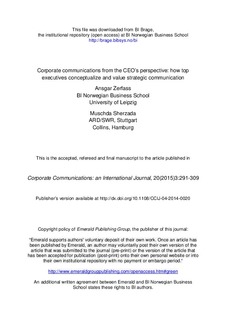| dc.contributor.author | Zerfass, Ansgar | |
| dc.contributor.author | Sherzada, Muschda | |
| dc.date.accessioned | 2016-06-29T09:20:32Z | |
| dc.date.available | 2016-06-29T09:20:32Z | |
| dc.date.issued | 2015 | |
| dc.identifier.citation | Corporate Communications: an International Journal, 20(2015)3:291-309 | nb_NO |
| dc.identifier.issn | 1356-3289 | |
| dc.identifier.issn | 1758-6046 | |
| dc.identifier.uri | http://hdl.handle.net/11250/2394545 | |
| dc.description | This is the accepted, refereed and final manuscript to the article | nb_NO |
| dc.description.abstract | Purpose – The purpose of this paper is to explore the perceptions and expectations of chief
executive officers (CEOs) and executive board members concerning: the relevance of public
opinion and contribution of communication performance to organizational success, the
communicative role of top executives and their interaction with professional communicators, the
objectives and values of corporate communications, and the importance of various disciplines
and instruments.
Design/methodology/approach – A quantitative survey was conducted among top executives of
listed and private companies operating in the largest European country, Germany (n=602).
Findings – The study identifies a traditional mindset: top executives focus on primary
stakeholders (customers, employees) instead of secondary stakeholders (politicians, activists),
they value mass media higher than social media, and they rate speaking more important than
listening. Moreover, communication professionals are not always the first choice when CEOs
and board members reflect on the topics at hand. Advanced visions of strategic communication
developed in academia and practice have not yet arrived in many boardrooms.
Research limitations/implications – The sample is not representative for all CEOs in
corporations and it is limited to one country.
Originality/value – While the performance of corporate communications depends heavily on the
perceptions, beliefs, and expectations that top executives hold towards communication and its
contribution to organizational goal, little is known about this. Most knowledge is based on
qualitative interviews and small-scale samples. This study provides an overview of previous
insights and takes a broader empirical approach. | nb_NO |
| dc.language.iso | eng | nb_NO |
| dc.publisher | Emerald | nb_NO |
| dc.title | Corporate communications from the CEO’s perspective: how top executives conceptualize and value strategic communication | nb_NO |
| dc.type | Journal article | nb_NO |
| dc.type | Peer reviewed | nb_NO |
| dc.source.journal | Corporate Communications: an International Journal | nb_NO |
| dc.identifier.doi | http://dx.doi.org/10.1108/CCIJ-04-2014-0020 | |
| dc.description.localcode | 1. Forfatterversjon | nb_NO |
